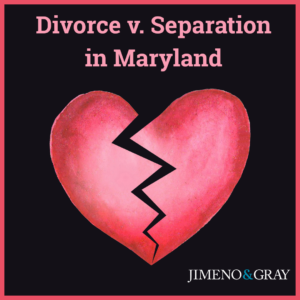Divorce vs. Separation in Maryland: What You Need to Know
 Pretty much everyone understands what divorce is, but separation can be a little confusing, particularly in states like Maryland that have no “legal separation.” In this article, we will explain the differences between divorce and separation in Maryland, and when it’s best to pursue each.
Pretty much everyone understands what divorce is, but separation can be a little confusing, particularly in states like Maryland that have no “legal separation.” In this article, we will explain the differences between divorce and separation in Maryland, and when it’s best to pursue each.
Divorce in Maryland
Divorce (or sometimes referred to as “absolute divorce” in Maryland), is a process that legally ends a marriage, its benefits and responsibilities. Once you get a divorce, you are single and can remarry if you like. Along with ending the marriage, the court issues orders for division of property and debts, child custody, child support, alimony (if any), and any name changes.
Up until October 2023, you could get either a limited divorce or an absolute divorce in Maryland. For all intents and purposes, limited divorce was Maryland’s version of legal separation. Absolute divorce, on the other hand, ends the marriage completely and permanently. As of October 2023, you can no longer get a limited divorce in Maryland. You can still separate, but there is no decree of legal separation, and it’s less stringent than the former limited divorce process.
Grounds for Divorce
Today, there are three possible grounds for a Maryland divorce.
- Mutual consent: Both spouses agree to the divorce and file a written settlement agreement. The settlement agreement would cover all aspects of the divorce including child custody, child support, visitation, alimony, and property division.
- Irreconcilable differences: This is a broad, no-fault ground for divorce that means one of the parties or both are certain their differences can not be resolved, so they want a divorce.
- Six month separation: A six month separation is where the parties live separately, but this can be in the same house, for at least six months. More on this in a moment.
Separation in Maryland
As already mentioned, there is no longer “limited divorce” in Maryland or anything referred to as ‘legal separation”. Previously, spouses could get a decree of limited divorce where they could get court orders covering such things as child custody, child support, and alimony, but were still considered married. This was usually used when the parties were not yet eligible for absolute divorce.
Now that limited divorce has been abolished, how can spouses separate, particularly in a manner that will be recognized as grounds for divorce?
You and your spouse must live separately without interruption for at least six months in order to use a six-month separation as grounds for divorce when you file a divorce complaint. You have to pursue separate lives, and that includes no sexual intimacy. However, you can still live under the same roof.
When Should I Get a Separation in Maryland Instead of Just Divorcing?
Whether or not you want to separate or go directly to filing for divorce on other grounds depends on a number of factors. How you weigh these factors is up to you, your spouse and your individual circumstances. Here are some reasons that certain people may want to separate instead of getting a divorce, at least for awhile.
- You are still hoping to save your marriage or are just not quite ready for divorce.
- You are concerned about the effects of divorce on your children and may want to put it off.
- Divorce is against your religion.
- One of you will lose your health insurance if you divorce. This is particularly a concern if one of you is suffering from a chronic illness.
- You don’t want to split up jointly owned property.
- There are legal or financial benefits to staying married. For example, if it is advantageous to file taxes jointly, this can still be done if the couple is separated but not if they are divorced.
Should We Sign a Separation Agreement?
Although not required, in many cases, it makes sense for the spouses to sign a separation agreement, particularly if they have children or property of any consequence. The separation agreement can address child support, child custody, visitation, finances and spousal support. It can bestow some of the legal protections of a divorce decree.
A separation agreement shows beyond a shadow of a doubt that both parties agree to the separation. The terms can be changed if both parties agree before getting an absolute divorce, but often it is used as the divorce settlement.
When Should I Get a Divorce Instead of a Separation?
There is no sense putting off a divorce without reason. You may want to go directly to divorce instead of separation under some of the following circumstances.
- You have no intention to reconcile.
- One of the parties would like to remarry.
- It would be better for the mental health of both parties to end the relationship and move on. This is particularly true where the relationship has disintegrated into hostility.
- There are significant assets that it would be better to divide now rather than putting it off to the future.
- You want to avoid any liability for debts your spouse may incur.
- You want to divide retirement accounts or pensions. These would usually have to be divided in a divorce. They are not divided if you have an informal separation, but they could be divided under a signed separation agreement.
Considering Divorce or Separation in Maryland?
If you are debating whether or not to get a separation or just immediately get a divorce, one of our experienced Maryland family law attorneys can help you consider the ramifications each for your own situation. Schedule an appointment to discuss what is best for you and your family.
Meet Our Team

Gregory P. Jimeno, Esquire
Partner

Frank C. Gray, Jr., Esquire.
Partner

Magaly Delisse Bittner, Esquire
Partner

Jessica McConnell, Esquire
Associate

Lisa Eckstorm
Office Manager and Funding Coordinator

Alex Avioli-Bent
Paralegal

Erin Finn
Paralegal

Karen Nolasco
Paralegal

Robyn Youssef
Intake Specialist
